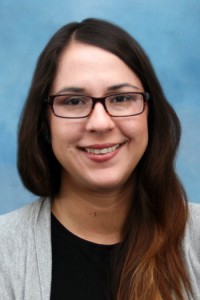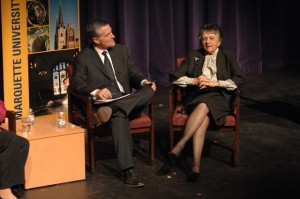Congratulations to AWL Scholarship Winners Carstens and Fahley
On Tuesday, September 11, 2012, the Milwaukee Association for Women Lawyers (AWL) Foundation honored two Marquette University Law School students with scholarships.
Codi Carstens, 2L, received the AWL Foundation scholarship. The AWL Foundation Scholarship is awarded to a woman who has exhibited service to others, diversity, compelling financial need, academic achievement, unique life experiences (such as overcoming obstacles to attend or continue law school), and advancement of women in the profession. Carstens is a first-generation college graduate and a first-generation law student. She is supporting herself through law school, yet she has found the time for public service, already completing 180 hours of volunteer time doing pro bono work in the community, primarily through the Wisconsin chapter of the Association of Corporate Counsel. Carstens is also a member of the student chapter of AWL.
Alaina Fahley, 3L, received the AWL Foundation’s Virginia A. Pomeroy scholarship. This scholarship honors the late Virginia A. Pomeroy, a former Deputy State Public Defender and a past president of AWL. In addition to meeting the same criteria as for the AWL Foundation scholarship, the winner of this scholarship must also exhibit what the AWL Foundation calls “a special emphasis, through experience, employment, class work or clinical programs” in one of several particular areas: appellate practice, civil rights law, public interest law, public policy, public service, or service to the vulnerable or disadvantaged. Fahley has a sister with autism. Her experience with her sister has emphasized for her the importance of working with vulnerable populations and her plan to practice public interest law upon graduation. Fahley is a member of the student chapter of AWL and a member of the Pro Bono Society, and she volunteers at the Marquette Volunteer Legal Clinic. She is currently the President of the Public Interest Law Society.
Congratulations to both women for outstanding service and for their representation of Marquette University Law School.


